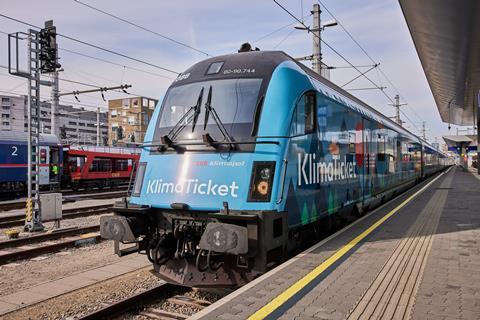
AUSTRIA: An €18·2bn investment framework for Austrian Federal Railways covering 2022-27 was approved by the council of ministers on November 3. Taking climate change mitigation targets into account, it is a modification of an earlier plan covering 2021-26 which envisaged a slightly lower spend of €17·5bn.
The investment plan ‘is an important building block for more climate protection’, explained Climate Protection Minister Leonore Gewessler.
Major projects in the plan include:
- four-tracking between Schaftenau and Radfeld junction on the northern approach to the Brenner Base Tunnel;
- the Koralmbahn project;
- Semmering base tunnel;
- a connection from Wien airport to Bruck an der Leitha;
- four-tracking between Wien Meidling and Mödling to facilitate S-Bahn expansion;
- modernisation of the Nordbahn;
- double-tracking the Tullnerfelder Bahn between Herzogenburg and St Pölten;
- double-tracking between Werndorf and Spielfeld-Straß;
- Linz – Wels four-tracking as part of the Weststrecke upgrading programme;
- work to accommodate more and longer trains at locations including Villach Hbf, Ried im Innkreis, Innsbruck Hbf and Imst-Pitztal;
- providing more freight capacity to help increase rail’s modal share;
- deploying digital technology to increase safety and efficiency.
‘This plan will make rail travel in Austria even better and more efficient’, said ÖBB CEO Andreas Matthä. ‘Investment in the main lines will bring faster connections between the large metropolitan areas, but we are also going to invest in regional routes to make local railway transportation more attractive and electrified. This makes switching to the train more attractive in rural areas as well, a gain for the passengers and for the environment.’
Approval of the spending package recognises the need to boost rail capacity following the formal launch of the national KlimaTcket on October 26. This provides a year of unlimited travel on all scheduled public transport services in Austria for €1 095, although night trains require a supplement, and tourist-oriented services are excluded. Regional versions of the KlimaTicket are also being rolled out.
‘A modern network and a cheap KlimaTicket make public transport more attractive than ever before’, said Gewessler. ‘Every kilometre by train protects our climate.’

















